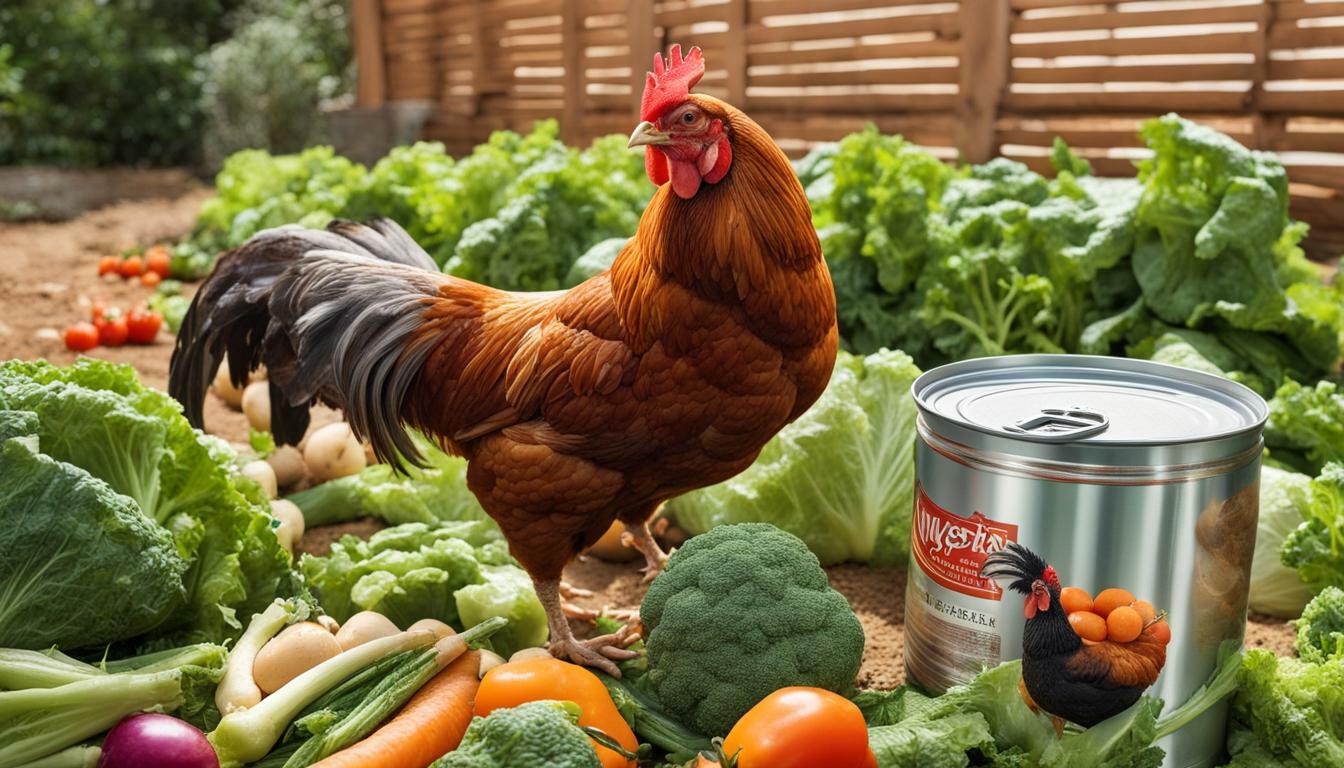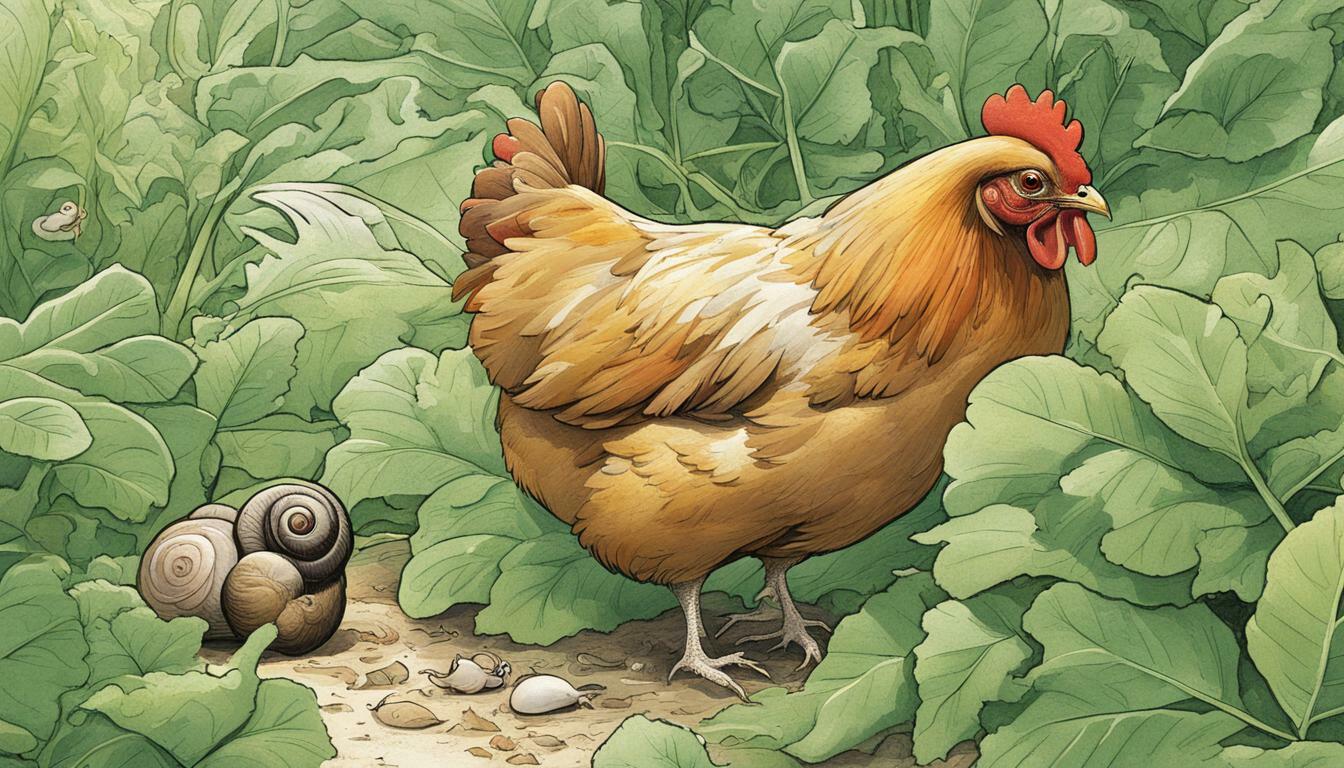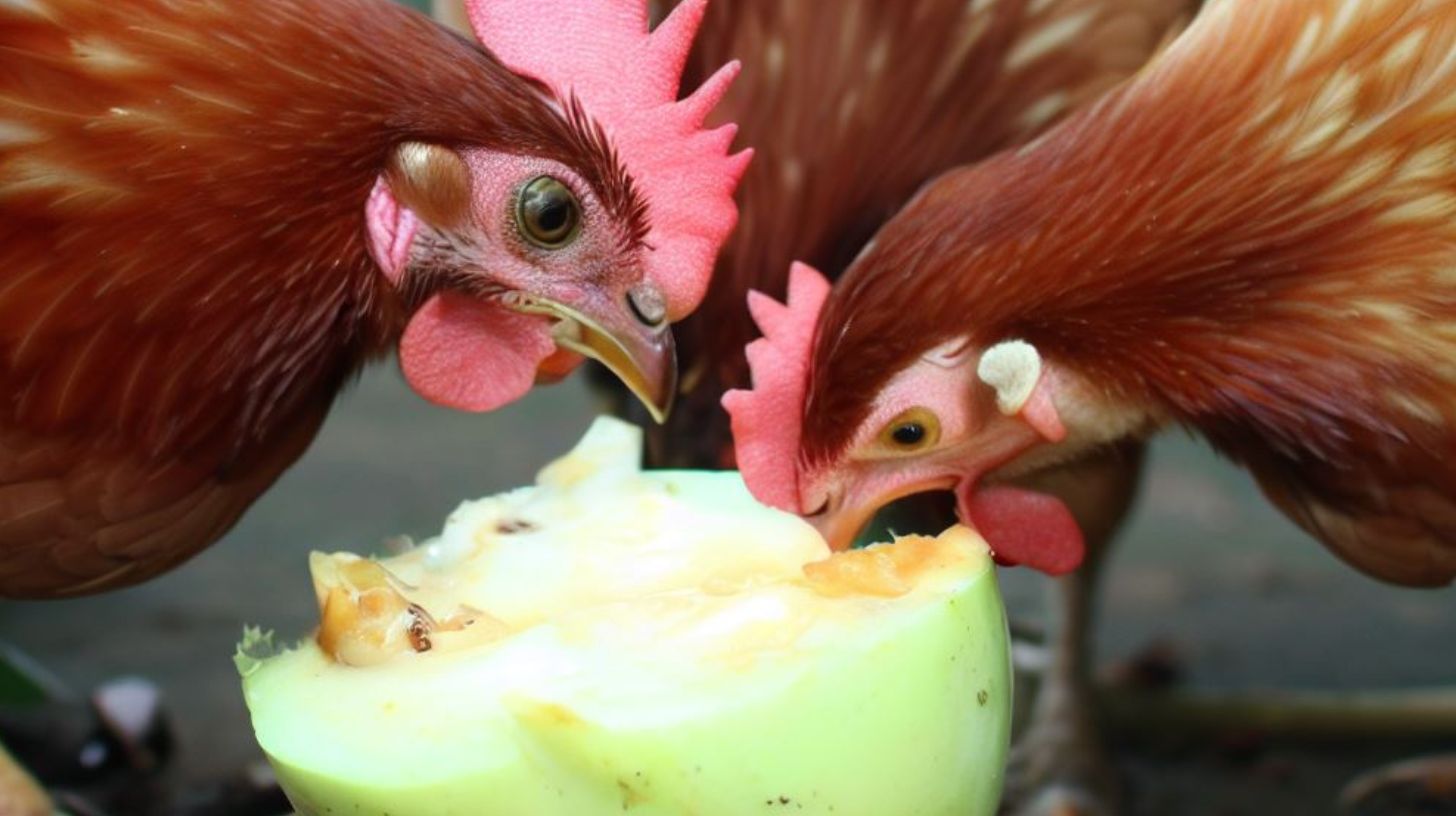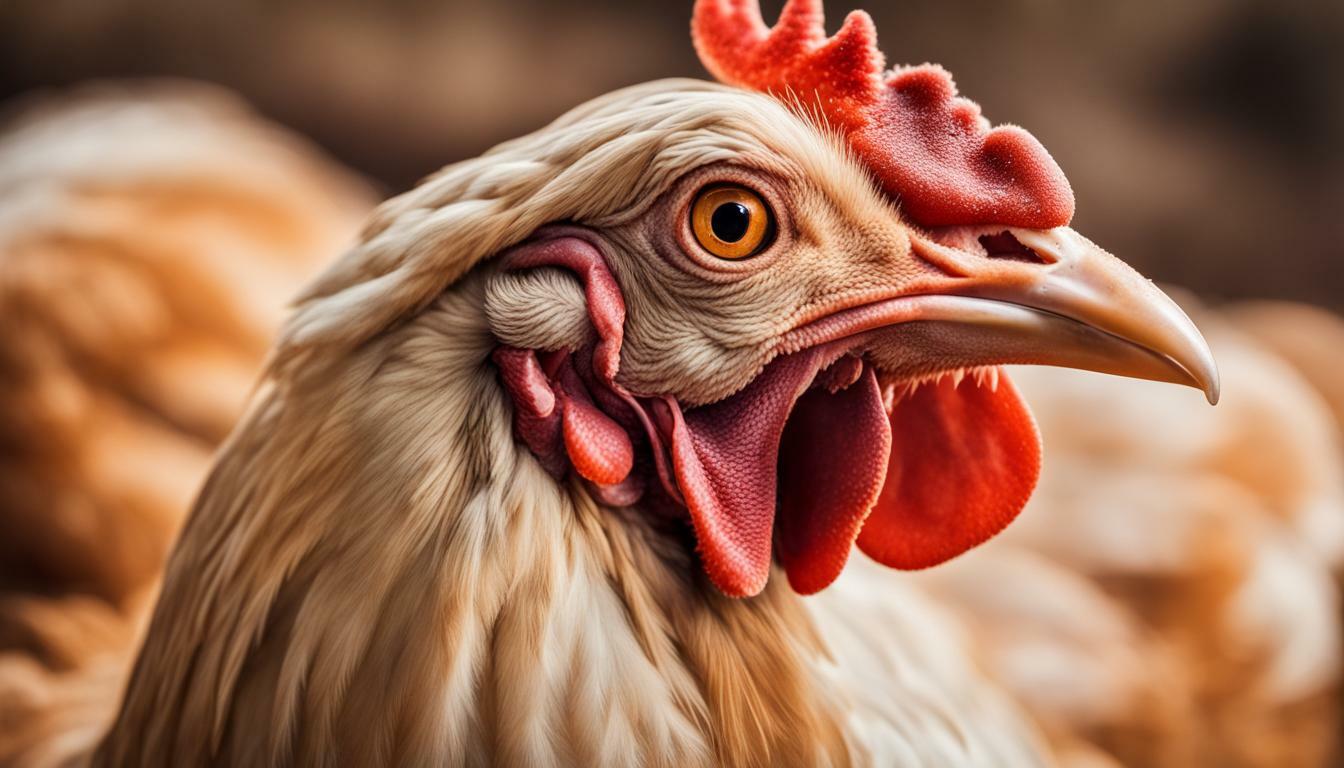Can Chickens Eat Canned Vegetables? Find Out the Answer

Table of content:
- The Nutritional Benefits of Canned Vegetables for Chickens
- Best Canned Vegetables for Chickens
- Are Canned Vegetables Safe for Chickens to Eat?
- Are There Any Canned Vegetables Toxic to Chickens?
- What Canned Vegetables Can Chickens Eat?
- Should You Rinse Canned Vegetables Before Feeding To Chickens?
- How Much Canned Vegetables Can You Feed Your Chickens?
- Is It Okay to Feed Chickens Canned Mixed Vegetables?
- Final Thoughts
Chickens can absolutely eat canned vegetables as part of their diet. In fact, canned veggies can provide important nutrients and variety to a chicken’s food intake. However, there are some key things to consider when feeding chickens canned produce to ensure it is safe and beneficial for them.
The Nutritional Benefits of Canned Vegetables for Chickens
Canned vegetables can be a healthy supplement to a flock’s diet. Here are some of the key nutrients they provide:
Vitamins
Many canned veggies are packed with vitamin A, vitamin C, B vitamins, and vitamin K. This helps chickens maintain bodily functions, immunity, vision, bone health, and more.
Minerals
Canned vegetables contain dietary minerals like calcium, potassium, iron, magnesium, phosphorus and zinc. Minerals promote bone strength, oxygen circulation, and enzyme production in chickens.
Fiber
The fiber in canned veggies aids chickens’ digestion and gut health. It may also help minimize issues like impacted crop.
Carotenoids
Carotenoids like beta carotene are found in many orange or green canned veggies and are beneficial for chickens. Carotenoids enhance chickens’ immune function and coloration.
Antioxidants
Antioxidants in canned produce like vitamin C, vitamin E, and lycopene neutralize free radicals. This reduces cell damage and inflammation in chickens.
Moisture
The high moisture content in canned vegetables helps keep chickens well hydrated. This is especially helpful in the hot summer months.
So in moderation, canned vegetables can provide great supplemental nutrition to chickens on top of their standard feed ration.
Best Canned Vegetables for Chickens
Not all canned veggies are created equal when it comes to nutritional value. Here are some of the top choices:
Canned Carrots
An excellent source of vitamin A for eye and skin health. Also provides vitamin K, potassium, and antioxidants.
Canned Sweet Potatoes
Provide vitamin A, vitamin C, potassium, copper, and fiber. The beta carotene boosts immunity.
Canned Pumpkin
Packed with vitamin A, antioxidants, fiber, and minerals like copper and potassium. Also aids digestion.
Canned Green Beans
Great source of vitamin K, vitamin C, manganese, and fiber. Low in fat and calories too.
Canned Corn
Provides carbohydrates along with lutein and zeaxanthin antioxidants for eye health. Also contains pantothenic acid.
Canned Tomatoes
High in vitamin C, biotin and vitamin K. Provide lycopene antioxidant and beta carotene for immunity.
Canned Peas
Include vitamins A, K, B6, and C along with phosphorus, zinc, copper, and iron. Also a good protein source.
When selecting canned vegetables for chickens, aim for low sodium varieties without added sugars or seasonings. Steer clear of onions, garlic, and seasoned options as they can be unhealthy for chickens.
Are Canned Vegetables Safe for Chickens to Eat?
Canned vegetables are generally safe for chickens to eat in moderation, but there are a few precautions to take:
- Rinse thoroughly – Rinse canned veggies well to remove excess sodium, preservatives, or liquids. This reduces the risks of high salt intake.
- Avoid damaged cans – Don’t feed chickens from cans that are rusted, dented, leaking, or swollen. Botulism is a risk.
- Moderate portions – Too many canned veggies can throw off the nutritional balance of a chicken’s diet. Feed sparingly as a supplement.
- No seasoning – Avoid canned veggies with added flavors, sugars, fats, or other ingredients. Stick to plain, unseasoned varieties.
As long as you follow these guidelines, canned vegetables are a safe, healthy treat for chickens. But they shouldn’t become a diet staple or replace poultry feed as the main food source.
Are There Any Canned Vegetables Toxic to Chickens?
Most canned vegetables are fine for chickens if fed in moderation. However, there are 2 types of canned veggies that can be potentially toxic or harmful:
Onions/Garlic
Onions and garlic contain sulfoxides and disulfides which can damage red blood cells leading to anemia in chickens. Avoid feeding onions and garlic.
Salt and Sodium
Excess salt and sodium is unhealthy for chickens. Always opt for low or reduced sodium vegetable varieties. Rinsing the veggies helps remove some excess salt as well.
As long as you stick to plain, unseasoned options and rinse them thoroughly before feeding, canned vegetables are perfectly safe for chickens to eat.
What Canned Vegetables Can Chickens Eat?
Here is a list of the most common safe, healthy canned vegetables to feed chickens:
- Carrots
- Sweet Potatoes
- Pumpkin
- Peas
- Green Beans
- Corn
- Beets
- Spinach
- Mixed Veggies (without onions/garlic)
Canned plain tomatoes or tomato sauce is fine for chickens too but avoid seasoned tomato varieties. Rinse all canned veggies well before feeding.
And remember – moderation is key. Canned produce should be an occasional treat, not a main dietary component.
Should You Rinse Canned Vegetables Before Feeding To Chickens?
It’s highly recommended to rinse canned vegetables before feeding them to chickens. Here’s why:
Removes Excess Salt
Canned veggies contain added salt from the canning process. Rinsing removes some of the sodium to make them safer for chickens.
Reduces Preservatives
Canned foods use preservatives which can be unhealthy in large amounts. Rinsing the vegetables helps diminish excess preservative intake.
Gets Rid of Liquid
The liquid in canned goods could contain higher salt concentrations. Rinsing ensures chickens don’t consume too much salty liquid.
Prevents Mess
Rinsing canned veggies prevents the wet, goopy liquid from making a mess when chickens eat from it.
Discourages Rodents
The strong scent of canned goods and liquid could attract mice or rats. Rinsing vegetables helps minimize this risk.
For best practices, always rinse canned vegetables thoroughly before serving them to chickens. This improves the safety and health profile of canned produce as supplemental chicken feed.
How Much Canned Vegetables Can You Feed Your Chickens?
When feeding canned vegetables to chickens, moderation is key. Here are some feeding guidelines:
- No more than 1-2 times per week
- 1/4 to 1/2 cup per chicken
- Avoid feeding daily or free choice
- Split amount between morning and afternoon
- Provide as a snack, not a meal replacement
Keep in mind that chickens should get most of their nutrition from a complete feed ration. Supplements like canned veggies are for added variety and nutrients only.
Monitor your flock as you introduce canned vegetables. Decrease portions if you notice soft stools or diarrhea indicating too much. Finding the right balance takes some experimentation.
The small serving sizes ensure chickens don’t fill up on the canned veggies instead of their regular feed. This helps maintain a balanced, nutritious diet.
Is It Okay to Feed Chickens Canned Mixed Vegetables?
Canned mixed veggies can make a great supplemental treat for chickens as long as you follow a few guidelines:
- Select plain, unseasoned varieties
- Avoid mixes with onions, leeks, shallots, chives or garlic
- Rinse thoroughly to remove extra sodium
- Check the ingredients to ensure no harmful additives
- Feed in moderation – 1-2 times per week maximum
The wider variety of vegetables provides an array of vitamins, minerals, and antioxidants for beneficial nutrition. Just be vigilant about rinsing to minimize salt content and portion sizes.
With so many nutritious options, canned vegetables can add important supplemental nutrition to your flock’s diet and provide healthy variety. As always, moderation and common sense are key to integrating new treats into your chickens’ feeding regimen.
Final Thoughts
Canned vegetables make a nutritious, safe addition to a backyard flock’s diet when fed properly. Key takeaways include:
- Select low sodium, plain vegetable varieties
- Thoroughly rinse cans before feeding to chickens
- Avoid seasoned options or veggies with onions/garlic
- Feed 1-2 times per week in limited portions
- Focus on providing a balanced main diet with supplemental treats
With so many canned veggie choices like carrots, peas, green beans, corn, and more, you can provide great variety. Just be careful of sodium content, know which veggies to avoid, and feed in moderation. With some common sense, canned produce can be a great way to supplement your chickens’ nutritional needs. Happy feeding!
Welcome. I’m Adreena Shanum, the proud owner of this website, and I am incredibly passionate about animals, especially poultry. I founded adreenapets.com as a labor of love, stemming from my desire to share my knowledge and experiences with poultry enthusiasts worldwide.




